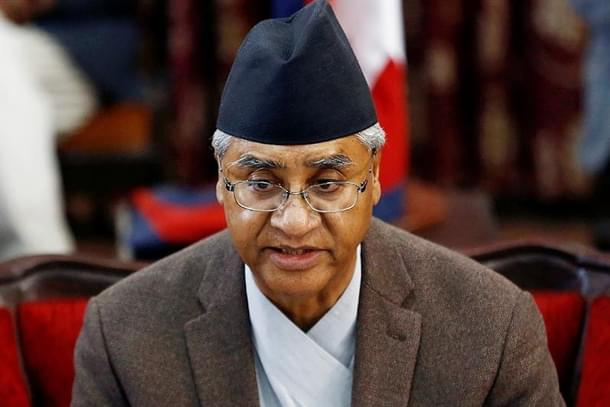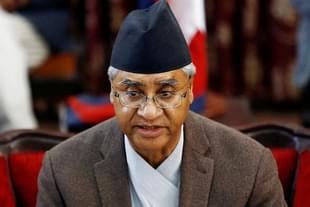News Brief
Why Appointment Of Sher Bahadur Deuba As Prime Minister Of Nepal Is Good News For India
Swarajya Staff
Jul 13, 2021, 01:59 PM | Updated 01:58 PM IST
Save & read from anywhere!
Bookmark stories for easy access on any device or the Swarajya app.


The politics of Nepal has been in a flux for a year now. In the past eight months, the country's Parliament has been dissolved twice.
Following a rift in the ruling Nepal Communist Party (NCP) in December last year, Prime Minister (PM) K P Sharma Oli recommended dissolution of Parliament to President Bidya Devi Bhandari.
In February 2021, Nepali Supreme Court reversed the decision of the President and the house was reconstituted in May. When the vote of confidence took place, Oli was routed. He again recommended the dissolution of Parliament, and conducting fresh elections. He said that no party had the numbers to form a government, and remained caretaker Prime Minister.
On 22 May, President Bhandari dissolved the 275-member lower house and announced snap elections on 12 and 19 November.
Reportedly, as many as 30 petitions were filed against the dissolution, one of them by the opposition parties’ alliance with the signature of 146 lawmakers, demanding reinstatement of the lower house and appointment of Nepali Congress chief Sher Bahadur Deuba as the prime minister.
However, yesterday (12 July), a five-member constitution bench of the Supreme Court, led by Chief Justice Cholendra Shumsher Rana, not only reinstated the house of representatives — the second time in five months — but also directed the President to appoint the head of the opposition party as prime minister by Tuesday.
As per the order, the current leader of opposition Sher Bahadur Deuba is set to become the prime minister of Nepal.
The court held as unconstitutional President Bhandari’s decision to dissolve the lower house upon a recommendation of Prime Minister K P Sharma Oli. It also ordered summoning a new session of the House of Representatives on 18 July. The bench also said that party whip does not apply when lawmakers take part in the vote of confidence for the prime minister.
The judgement is a blow to the 69-year-old veteran communist leader, who was preparing for snap elections.
In December 2020, after a meeting between Pushpa Kamal Dahal, also known as Prachanda, and Madhav Kumar Nepal, Oli was ousted as the parliamentary leader of Nepal Communist Party. The Dahal-Nepal faction reached out to the country's Election Commission claiming that they hold a majority in the party and therefore should be given official recognition. In January, a standing committee meeting of the faction decided to expel Oli from the party.
Nepal welcomed the SC verdict, saying, “the Supreme Court has done a commendable job. This has saved the political system that is in place. Since the court has directly asked to appoint Deuba as new Prime Minister, we have no role to play now.”
“Parliament has been reinstated. We will now go to Parliament... the court’s verdict has also raised moral questions on Oli’s actions,” he added. Under Nepal's leadership, 23 lawmakers of the UML had put their signature in favour of Deuba’s claim to the prime ministership.
Who Is Sher Bahadur Deuba?
Seventy-four-year-old Deuba heads the Nepali Congress party. Born to a family in a remote village of Asigram in Dadeldhura of far-western Nepal, he holds a Bachelor’s in Law and a Master’s in Political Science.
Deuba started his political career as a leader of the student union. He also suffered jail time for his political beliefs for 10 years at different times from 1966 to 2005.
He has served four times in the past as the prime minister of Nepal — first from 1995 to 1997, then from 2001 to 2002, again from 2004 to 2005, and from 2017 to 2018. Currently, he is the Leader of the Opposition in the house.
Reportedly, India has always been on good terms with Deuba. His appointment, therefore, can be used to counter China which tried its best to keep its ideological counterpart — the NCP — united, and in power. On the other hand, Deuba can get tangible Indian support for the party and development of Nepal.
Meanwhile, Prime Minister Oli’s supporters, including youths and students affiliated to the ruling CPN-UML, took to streets to protest against the court’s verdict.




